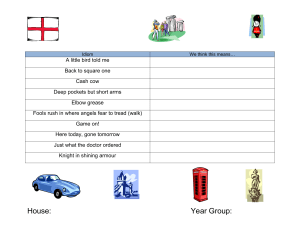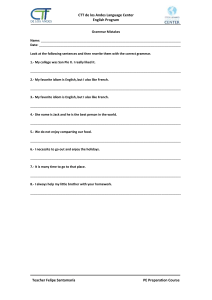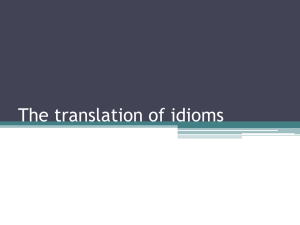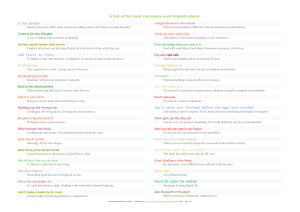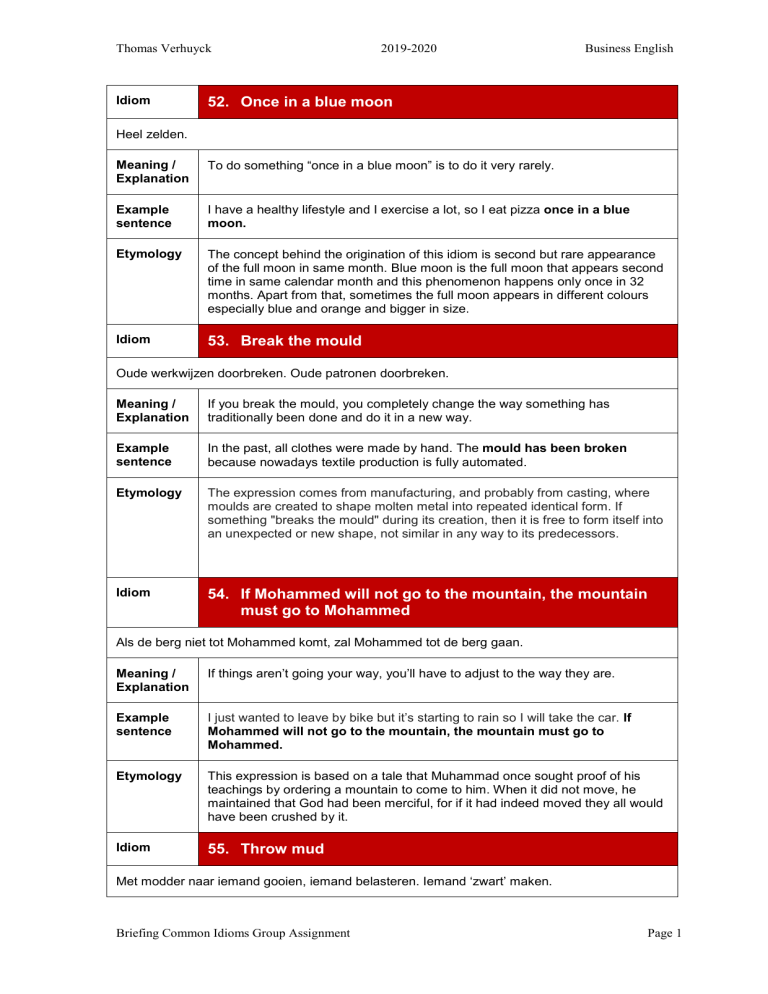
Thomas Verhuyck Idiom 2019-2020 Business English 52. Once in a blue moon Heel zelden. Meaning / Explanation To do something “once in a blue moon” is to do it very rarely. Example sentence I have a healthy lifestyle and I exercise a lot, so I eat pizza once in a blue moon. Etymology The concept behind the origination of this idiom is second but rare appearance of the full moon in same month. Blue moon is the full moon that appears second time in same calendar month and this phenomenon happens only once in 32 months. Apart from that, sometimes the full moon appears in different colours especially blue and orange and bigger in size. Idiom 53. Break the mould Oude werkwijzen doorbreken. Oude patronen doorbreken. Meaning / Explanation If you break the mould, you completely change the way something has traditionally been done and do it in a new way. Example sentence In the past, all clothes were made by hand. The mould has been broken because nowadays textile production is fully automated. Etymology The expression comes from manufacturing, and probably from casting, where moulds are created to shape molten metal into repeated identical form. If something "breaks the mould" during its creation, then it is free to form itself into an unexpected or new shape, not similar in any way to its predecessors. Idiom 54. If Mohammed will not go to the mountain, the mountain must go to Mohammed Als de berg niet tot Mohammed komt, zal Mohammed tot de berg gaan. Meaning / Explanation If things aren’t going your way, you’ll have to adjust to the way they are. Example sentence I just wanted to leave by bike but it’s starting to rain so I will take the car. If Mohammed will not go to the mountain, the mountain must go to Mohammed. Etymology This expression is based on a tale that Muhammad once sought proof of his teachings by ordering a mountain to come to him. When it did not move, he maintained that God had been merciful, for if it had indeed moved they all would have been crushed by it. Idiom 55. Throw mud Met modder naar iemand gooien, iemand belasteren. Iemand ‘zwart’ maken. Briefing Common Idioms Group Assignment Page 1 Thomas Verhuyck 2019-2020 Business English Meaning / Explanation To say insulting or unfair things about someone, especially to harm that person’s reputation. Example sentence The bullies are spreading gossip about the shy girl. They are really throwing mud at her. Etymology No clear origin found for this expression. Idiom 56. The name of the game De naam/het doel van het spel. Meaning / Explanation The most important part of an activity, or the aspect that you should have to succeed in doing something. Example sentence Making the right connections is the name of the game in finding a job these days. Etymology No clear origin found for this expression. Idiom 57. Stick your neck out Je nek uitsteken. Meaning / Explanation To take risk. If you stick your neck out, you bravely say or do something that might be criticized or might turn out to be wrong. Example sentence I’m really sticking my neck out by driving you home when I am drunk. If I get caught I will get in trouble. Etymology In the present form the saying originated as American slang some 60 years ago, probably based on the barnyard or backyard chicken that was laid on a chopping block with its neck stretched out and then beheaded with an ax. Idiom 58. Like looking for a needle in a haystack Een speld in een hooiberg zoeken. Meaning / Explanation Something that is impossible or extremely difficult to find, especially because the area you have to search is too large Example sentence Yesterday, my sister accidentally dropped her earring in the pool. We have been searching all day but it’s like looking for a needle in a haystack. Etymology Old farmer's tales would have a bale of haystack and to be able to find something that is as insignificant in size as a needle would be very difficult. In ancient times humans used needles made up of bone or wood that look similar to hay which makes it more difficult to find in a huge haystack and that's where this idiomatic expression was originated. Idiom 59. Slip/fall through the net Door de mazen van het net glippen. Briefing Common Idioms Group Assignment Page 2 Thomas Verhuyck 2019-2020 Business English Meaning / Explanation You use this idiom to describe a situation where people are not properly cared for by the system that is intended to help them. It is also possible to use this idiom when there is something that is unintentionally neglected or ignored. Example sentence There are many dogs and cats in animal shelters. Many people buy pets from a breeder, causing these cats and dogs in animal shelters to slip/fall through the net. Etymology No clear origin found for this expression. Idiom 60. Grasp the nettle De koe bij de horens vatten. Door de zure appel bijten. Meaning / Explanation To approach or begin a difficult or unpleasant task boldly and with the appropriate amount of energy. Example sentence I’m not good at mathematics but I should grasp the nettle to pass the exam. Etymology This expression refers to the belief that when you touch a nettle lightly (= a plant covered with hairs which sting sharply), it will be much more painful than when you seized tightly. Idiom 61. In the nick of time Op het nippertje. Meaning / Explanation If you say that something happens in the nick of time, you are emphasizing that it happens at the last possible moment. Example sentence This morning I had overslept so I was able to catch my train in the nick of time. Etymology The phrase used to be "in the nick" and dates back to the 1500s, when nick meant "the critical moment". A nick-stick was used to keep track of time, points and transactions that took place. It was especially useful in sport events. A nick is a small notch that is used as a marker. It is very small and precise. Thus, if something is done "in the nick" it is done at the exact place or time that it should be. Idiom 62. A night owl Een nachtraaf Meaning / Explanation Someone who regularly stays up late at night, or who prefers to work at night. Example sentence My brother likes to party every weekend until 4 am. It's not healthy being such a night owl. Etymology This expression comes from its literal meaning: owl. An owl is a nocturnal bird, meaning it is awake during the night rather than during the day. In the past, owl and nightowl (one word) were used interchangeably. Nowadays, owl is used for Briefing Common Idioms Group Assignment Page 3 Thomas Verhuyck 2019-2020 Business English the literal animal, and night owl is used for the figurative person. Night owl had a figurative meaning by as early as the 1500s. William Shakespeare used it his poem “The Rape of Lucrece” to refer to a person up late. Idiom 63. Dress to the nines Gekleed in het pak. Zich op zijn paasbest aankleden. (piekfijn uitgedost zijn) Meaning / Explanation To be very well-dressed and fashionable, typically for a formal event. Example sentence At an award ceremony or a premiere of a film, all attendees are dressed to the nines. They wear costumes and evening dresses with matching jewels. Etymology No clear origin found for this expression. Idiom 64. Keep your nose clean Blijf uit de problemen, jezelf gedeisd houden Meaning / Explanation To stay out of trouble, to behave properly. Example Sentence The police told me to keep my nose clean, otherwise I would have go to jail again. Etymology The idiom “keep your nose clean” comes from “Keeping one’s hands clean”. This is an idiom from the 18th century which meant avoiding corruption. Later it changed to ‘your nose’ for some reason when the idiom crossed the Atlantic Ocean. Later in the British Army it related to avoiding strong drinks with the allusion avoiding putting your nose in the glass. Idiom 65. In a nutshell In een notendop. Meaning / Explanation To summarize or describe something in only a few words. Example sentence My job is very extensive. To give you an explanation in a nutshell, I do everything related to finance. Etymology It is thought that the first use of the phrase “in a nutshell” was a literal one. There was said that a copy of the famous poem “Homer’s Iliad” could be miniaturized so that the whole text, written on tiny parchment, could fit into a walnut shell. William Shakespeare is the first known user of the image of a nutshell, without reference to the ancient story, as a type of something extremely small in his story “Hamlet”. Idiom 66. Hold your own Je mannetje staan. Briefing Common Idioms Group Assignment Page 4 Thomas Verhuyck 2019-2020 Business English Meaning / Explanation To be able to do something with a sufficient level of skill or as well as others can. Example sentence Steven can hold his own in any argument, in the end he always gets what he wants. Etymology No clear origin found for this expression. Idiom 67. Mind your p’s and q’s Op je taalgebruik letten. Meaning / Explanation Making an effort to be especially polite in a particular situation. Example sentence The language of teenagers can be very impolite. Therefore, their parents need to make sure their kids mind their p’s and q’s. Etymology This idiom comes from advice to printers’ apprentices and to children who are learning to write. The letters p and q are often difficult to differentiate. These days we see that on a QWERTY Keyboard the P is on the left side and the Q on the right side. Idiom 68. A nosey parker Het nieuwsgierig aagje, de curieuzeneuzemosterdpot. betweter Meaning / Explanation A nosey parker is someone who is overly interested / curious in things. Example sentence I always ask too many questions, they say that I’m a nosey parker. Etymology This idiom comes from Matthew Parker. He was the Archbishop of Canterbury in the 16th century and ordered several uninteresting inquiries. That’s why he had the nickname “nosy parker”. The phrase “nosy parker” was written for the first time in the end of the 19th century by the popular novelist Mary Elizabeth Braddon: “you’re asking’ too many questions for me, there’s too much of Mr. Nosey Parker about you”. Idiom 69. Part and parcel Deel uitmaken van. Een onderdeel van iets Meaning / Explanation If you say that something is part and parcel of something else, you are emphasizing that it is involved or included in it. Example sentence If you are self-employed, stress is part and parcel of your job. Etymology This expression originally was a legal term and was so used from the 15th century on, principally for clauses of a law and for parts of a landholding. With part meaning "a portion" and parcel "something integral with a whole," this idiom Briefing Common Idioms Group Assignment Page 5 Thomas Verhuyck 2019-2020 Business English began to be used more figuratively from about 1800. Patrick E. Dove wrote, “The moral law of the conscience is part and parcel of man himself ” Idiom 70. If you pay peanuts you get monkeys Als je pinda’s betaalt, krijg je apen. Als je slecht betaalt moet je geen topprestaties verwachten Meaning / Explanation If you pay very low wages, you will only attract incompetent or unskilled workers (because better workers can go elsewhere to earn better wages). Example sentence If you want to hire competent employees, you have to raise the wages because if you pay peanuts you get monkeys. Etymology This idiom was first used by James Goldsmith in a letter he wrote: “Hiring a large quantity of cheap labor is far less effective than properly hiring and paying for the best. 1,000 monkeys get far less done than three people. And if you barely pay people and they leave, just to find someone else who’s willing to work for such a cheap cost, realize you’re not getting the better deal. What you just did is replace a hardworking person with a monkey – you expecting them to think on the same intellectual capacity is absurd. Pay people right. If you pay peanuts you get monkeys“. It is not clear to who this letter was addressed or what the circumstances were. Idiom 71. Cast pearls before swines Parels voor de zwijnen gooien. (to cast/cast/cast = gooien, werpen) Meaning / Explanation You are wasting your time by offering something that is helpful or valuable to someone who does not appreciate or understand it. Example sentence The speakers were casting pearls before swines because the audience chatted throughout the conference. Etymology This phrase comes from the Bible: “Do not give the sacred to the dogs and do not throw your pearls before the swine; they would just trample them with their legs, turn around and tear you apart.”. Dogs and pigs are unclean animals for Jews. Whoever throws pearls for the swine, throws something that is expensive with animals that are unclean. Idiom 72. Like two peas in a pod Als twee druppels water. / twee handen op één buik. Meaning / Explanation To be very similar in appearance or character. Example sentence I am surprised that Thomas and Robin aren’t related. They look like two peas in a pod. Etymology This expression alludes to the seeds contained in a pea pod, which do indeed look very much alike. Idiom 73. The pecking order Briefing Common Idioms Group Assignment Page 6 Thomas Verhuyck 2019-2020 Business English De hiërarchie, de rangorde. De pikorde (bij kippen) Meaning / Explanation A sequence or hierarchy of authority in an organization or social group. Example sentence In a company’s pecking order, an employee is in a lower position than the director. Etymology The expression originated from a description of social behavior among chickens, which attack each other by pecking to establish dominance. Idiom 74. Two a penny / ten a penny / two a dime Dertien in een dozijn. (goedkoop, overvloedig aanwezig) Meaning / Explanation Something that isn’t valuable or interesting because it is very common and easy to find. Example sentence Teenagers who want to become a famous model is two a penny / ten a penny / two a dime Etymology No clear origin found for this expression. Idiom 75. Be no picnic Het is geen lachertje, / geen pretje Meaning / Explanation A difficult or unpleasant situation. Example sentence Raising children as a single mother is no picnic. Etymology “Recovering from abdominal surgery is no picnic.” This expression, alluding to a picnic as a pleasant occasion, was first recorded in 1888. Briefing Common Idioms Group Assignment Page 7

